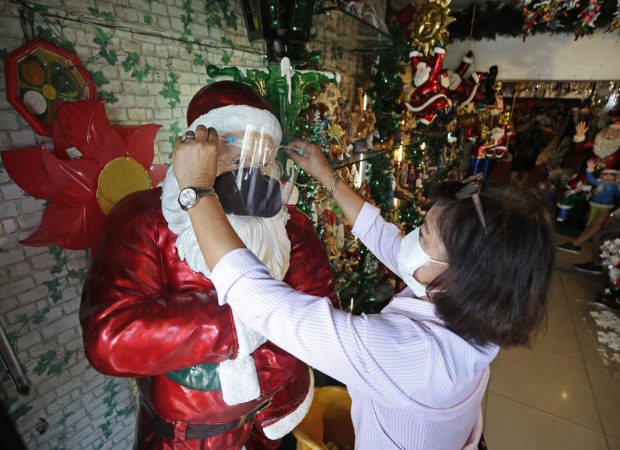Metro Manila still has most COVID-19 cases as infections hit more than 220,000

GOOD OLE ST. NICK PROTECTED For his protection, Santa Claus is made to wear a mask and a face shield by owner Jo Santos inside her store of Christmas figures on Lacson Avenue in Manila. Radios begin playing Christmas songs on Sept. 1. —RICHARD A. REYES
MANILA, Philippines — On the eve of the announcement of new quarantine levels, the Department of Health (DOH) reported 3,446 additional coronavirus infections, pushing the national case count to more than 220,000.
Of the new cases submitted by 97 of 110 accredited laboratories, 2,965 got sick between Aug. 18 and 31, while 405 fell ill between Aug. 1 and 17. The nationwide tally stood at 220,819 cases.
Metro Manila reported the most number of new cases, 1,900, followed by Laguna (163), Cavite (161), Leyte (155) and Pampanga (116).
The DOH reported that 165 more patients had recovered, bringing the total number of COVID-19 survivors to 157,562. The death toll, however, rose to 3,558 as 38 patients succumbed to the severe respiratory disease.
Active cases
That left 59,699 active cases, of which 91.3 percent were mild, 6.2 percent asymptomatic, 1 percent severe, and 1.5 percent critical.
Article continues after this advertisementOf the newly reported deaths, 31 died in August, four in July, and three in June. Nineteen of the fatalities were from Metro Manila, nine from Calabarzon, four from Central Visayas, two from Central Luzon, two from Western Visayas, and one each from Ilocos and Zamboanga.
Article continues after this advertisementHealth Undersecretary Maria Rosario Vergeire reminded the public to deal only with the accredited laboratories should they opt for in-home collection of their samples.
Vergeire said that under current DOH guidelines, laboratories are allowed to collect samples from patients remotely, provided the health worker wears protective gear and the DOH is informed of the collection for proper monitoring.
“There are reports that unlicensed laboratories are providing home service. We are strictly monitoring this and we warn that sanctions can be imposed if we find out that they are not licensed labs but are offering these remote collection of specimens for COVID-19. That is allowed only for licensed laboratories,” she said.
Of the 113 accredited laboratories, 43 are in Metro Manila.
BCG not COVID-19 drug
Vergeire also said that just because there are reports of a drug or vaccine that potentially could be used against COVID-19 did not mean it should already be used.
Following reports that the BCG (Bacille Calmette-Guerin) vaccine is being studied for its potential to help people fight off COVID-19, Vergeire said there was still not enough evidence to show that it was indeed effective and should be used by the public.
“We would just like to remind the public that there are a lot of [medications] now that are reported to be useful against COVID-19. We still need to undertake the regulatory process for this, and if ever we intend to join in their trials we will provide information. But for now, there is not enough evidence that would say that BCG can have this good effect for COVID-19,” Vergeire said.
BCG, first used in 1921, is given to newborns to prevent tuberculosis.
A report by the global Vaccine Alliance, or Gavi, said researchers were looking into whether receiving a dose of BCG could prevent or help people fight off COVID-19 and reduce the number of deaths.
“Even if it can’t stop people contracting the disease, certain data suggests that there is a chance it may prove helpful in reducing the severity of symptoms responsible for the pandemic’s death toll,” Gavi said.
In a scientific brief in April, the World Health Organization (WHO) said that while there was no evidence that BCG could protect people from the infection, “two clinical trials addressing this question [were] under way.”
“In absence of evidence, [the] WHO does not recommend BCG vaccination for the prevention of COVID-19. [The] WHO continues to recommend neonatal BCG vaccination in countries or settings with a high incidence of tuberculosis,” the WHO said.
Breathing machines
Vergeire also said the DOH was scouting for suppliers of the high flow nasal cannula (HFNC) machines, which could be given to hospitals as an alternative to the mechanical ventilators used by COVID-19 patients with breathing problems.
Earlier, Philippine General Hospital said it found that it was better to delay the use of a mechanical ventilator and instead rely on HFNC machines.
The HFNC machine is more comfortable and less traumatic, as it delivers a higher flow of oxygen through the patient’s nose. With a mechanical ventilator, a tube would be inserted through a patient’s throat to aid breathing.
Dr. Jonas del Rosario, spokesperson for PGH, said immediately intubating a patient also increased the risk of ventilator-acquired pneumonia.
PGH has 22 HFNC machines. With those machines, Del Rosario said, the hospital had prevented at least 70 percent of its patients from being intubated.
Vergeire said the Office of Civil Defense had bought more HFNC machines for use in hospitals. She, however, did not say how many machines were bought.